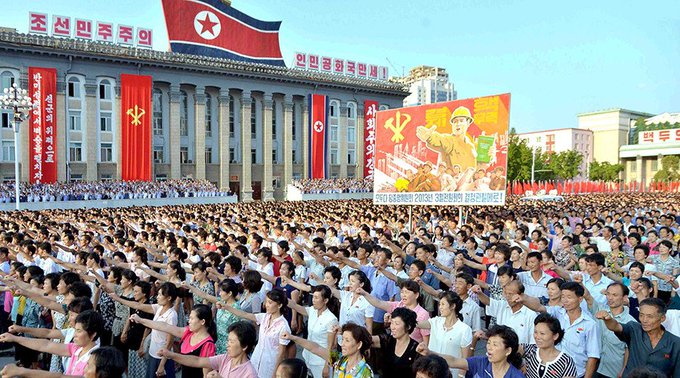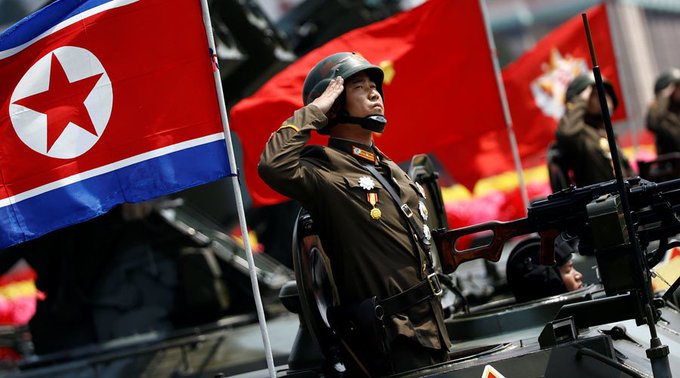Media hyping North Korea threat to sell the public on another war
Danielle Ryan is an Irish freelance writer, journalist and media analyst. She has lived and traveled extensively in the US, Germany, Russia and Hungary. Her byline has appeared at RT, The Nation, Rethinking Russia, The BRICS Post, New Eastern Outlook, Global Independent Analytics and many others. She also works on copywriting and editing projects. Follow her on Twitter or Facebook or at her website www.danielleryan.net.
It’s not every day that you’ll hear a news anchor be so upfront about the media’s worst proclivities — but last week, NBC anchor Brian Williams told a panel of guests that the media’s job was to “scare people to death” about North Korea.
Keep in mind that Williams is the same anchor who was widely ridiculed for waxing lyrical about the “beauty” of American missiles back in April when President Donald Trump bombed a Syrian air force base. Oh, and he’s also the guy who was suspended from his job for six months for making up a story about coming under fire in Iraq. Clearly, Williams has some issues with romanticizing war.
Anyway, what Williams said last week about the media’s role when it comes to tensions between the US and North Korea was remarkably revealing and forthright — even if he didn’t quite mean it that way.
Hyping the threat
Of course, escalating tensions between the US and North Korea are a clear cause for concern. The flippant way that American politicians have been talking about military action, which could have serious consequences for US allies in that region is heinous. The way Trump himself has ratcheted up tensions with threats of “fire and fury” the likes of which the world has never seen is irresponsible and is the kind of talk that sends the media into a frenzy.
Fox News recently did a segment on how sales of bunkers have gone up about 90 percent in the last two weeks. CBS Detroit reported on how “end of the world” preparation products, like gas masks and radiation antidote potassium iodide, are “flying off the shelves” in a local army supply store.
Media on the other side of the Atlantic are chiming in, too. The UK’s Sun newspaper published an actual World War 3 “survival guide” last week. It’s almost like they’re excited by the prospect of nuclear war.
Stories like these are the fruits of the media’s labor over the past few weeks. Their incessant hyping of the situation now has ordinary people stocking their shelves with doomsday supplies and installing nuclear bunkers on their properties.
Even a former State Department spokesman for the Obama administration has accused the media of “fanning the flames”when it comes to escalating tensions with North Korea.
Skewed coverage
Reading much of the coverage on the rising tensions with North Korea, it would appear that something major has changed recently — that North Korea has suddenly become an existential threat to the US in a way that it wasn’t before. It all seems so much more pressing and dangerous than it did last month.
But what actually happened? Aside from the fact that the leaders of both countries have been having a public shouting match, not a whole lot.
Yes, the US government’s Defense Intelligence Agency now believes North Korea has the capability to mount nuclear warheads on missiles, which could potentially be used to hit US targets. But North Korea has been claiming this capability since last March. So, that’s not new.
What is new is that the US intelligence community suddenly wants everybody to care about it. This shift should ring alarm bells, because it inevitably means that the US administration is beginning to construct a new narrative — a narrative it will need the media to fully support in the event that they decide to take military action against Pyongyang.
The narrative is that Kim Jong Un will, sooner or later, strike the US mainland, potentially with nuclear weapons — and that the US has no choice but to engage in ‘preventive’ war to stop him. The potential consequences — thousands dead in neighboring nations like South Korea and Japan — aren’t given nearly as much airtime or consideration. Who cares if they’re not Americans, right Lindsey Graham?
As ever, the media is more than willing to help the intelligence community construct their faulty narratives and sell the public on yet another useless military intervention based on evidence-free assertions that something bad will happen if the benevolent US military doesn’t jump in and stop it...by starting another war.
Capitalizing on ignorance
This narrative and the sensationalism with which it is spread relies primarily on the fact that the majority of Americans don’t know a whole lot about the history of their country’s relationship with North Korea.
If, for instance, the majority knew that the US had already mercilessly bombed North Korea for three years in the 1950s, they might be more willing to understand that country’s fears regarding US threats of “fire and fury” raining down on them.
Historian Bruce Cummings puts it simply: “We carpet-bombed the North for three years with next to no concern for civilian casualties.” The US effectively flattened the country, killed an estimated 3 million people (20% of the population), and “burned down every town”.
That is nothing short of pure evil — and yet today, Americans are left wondering why on earth North Koreans don’t like them? All the talk in the world about how oppressive the North Korean regime is, how all-encompassing North Korean propaganda is — will never erase that history.
A piece which appeared in The Intercept recently puts it well: “Millions of ordinary Americans may suffer from a toxic combination of ignorance and amnesia, but the victims of U.S. coups, invasions, and bombing campaigns across the globe tend not to.”
Balanced and nuanced coverage is far too much to hope for, though, when we already have one of the most watched news anchors in America proudly announcing that his job is to scare people to death.
The statements, views and opinions expressed in this column are solely those of the author and do not necessarily represent those of RT.







0 Comments:
Post a Comment
Subscribe to Post Comments [Atom]
<< Home